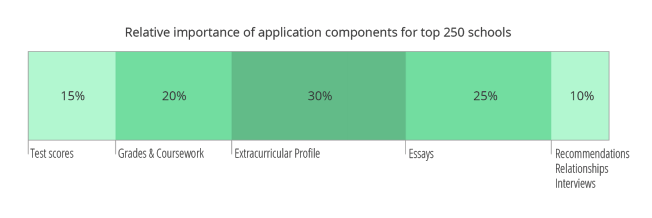How to Get Into the Ivy League
What’s Covered:
- What is the Ivy League?
- How Does the Ivy League Evaluate Applications?
- Calculate Your Chances of Acceptance at Ivies
Consisting of some of the most renowned and selective schools in the nation, the Ivy League is the dream of many high-achieving high school students.
But with deep applicant pools and fierce competition, a question frequently pondered is: How can I get into the Ivy League? In this post, we’ll do a deep dive of what the Ivy League is looking for, and how you can improve your chances.
What is the Ivy League?
The Ivy League is a collection of eight colleges and universities in the Northeast known for their extremely high academic standards, fiercely competitive admissions, and rich histories.
Although these schools are best known for attracting brilliant students, the Ivy League has its origins in athletics—the Ivy League was established in 1954 as an athletic conference.
Below is some general information about the eight Ivy League schools.
| School Name | Location | Acceptance Rate | Undergraduate Enrollment |
| Brown University | Providence, RI | 5.1% | 6,792 |
| Columbia University | New York, NY | 3.9% | 8,842 |
| Cornell University | Ithaca, NY | 7.4% | 15,503 |
| Dartmouth College | Hanover, NH | 6.2% | 4,732 |
| Harvard University | Cambridge, MA | 3.4% | 5,227 |
| Princeton University | Princeton, NJ | 5.8% | 5,267 |
| University of Pennsylvania | Philadelphia, PA | 4.1% | 10,106 |
| Yale University | New Haven, CT | 4.4% | 6,494 |
How Does the Ivy League Evaluate Applications?
The Ivy League represents some of the highest-rated institutions in the nation—three out of the five U.S. News top-ranked national universities are Ivy League schools. Because of this, the Ivies get considerably more applications from highly qualified candidates than they can accept, hence they have some of the lowest acceptance rates in the country.
The key to getting into the Ivy League is surprisingly simple: understand what they’re looking for in applicants and work to meet their expectations.
In general, these schools are not just looking for the best students; rather, they’re looking for applicants with exceptional academic acumen who possess the potential to do great things. Successful alumni reflect well on the school and lead to more donations, which allows the school to become even more prestigious.
The future potential of an applicant is a fairly abstract idea and something not as easily quantified as factors like GPA and test scores. Consequently, the schools of the Ivy League place particular importance on other areas of an applicant’s profile, such as extracurricular activities and essays.
Academics
The first step to getting into the Ivy League is to clear the academic requirements. Because of the large number of applications the Ivy League schools receive, they employ metrics like the Academic Index to identify serious candidates and expedite the admissions process.
The Academic Index is a tool used by admissions officers at Ivy League schools (and other selective colleges) to summarize a student’s overall academic performance into a single number—and while the use of the Academic Index is ubiquitous at the Ivies, these selective schools all have their own unique ways of calculating it. In general, the Academic Index takes three factors into consideration: an applicant’s GPA and/or class rank, their SAT or ACT scores, and SAT Subject Test scores (if the school requires them).
Since each Ivy League school has its own formula to calculate Academic Index, the best way to make the cut is to have test scores on the upper end, or above, a school’s middle 50% of accepted students. Students should also take the most challenging coursework available to them, like AP/IB and dual-enrollment classes with colleges, and aim to earn as many As as possible, especially in more challenging classes.
Here are the middle 50% SAT and ACT ranges at the Ivies, so you can see how you stack up:
| School Name | Middle 50% SAT | Middle 50% ACT |
| Brown University | 1440-1550 | 32-35 |
| Columbia University | 1480-1560 | 33-35 |
| Cornell University | 1400-1560 | 32-35 |
| Dartmouth College | 1440-1560 | 32-35 |
| Harvard University | 1460-1580 | 33-35 |
| University of Pennsylvania | 1460-1550 | 33-35 |
| Princeton University | 1460-1570 | 33-35 |
| Yale University | 1470-1560 | 33-35 |
Extracurriculars
Extracurricular activities play an oversized role in how to get into the Ivy League—CollegeVine calculates that they represent a larger part in admissions decisions than any other single factor. This is because top schools get thousands of academically-qualified applicants that appear relatively similar on paper. Extracurricular activities provide colleges with insight into an applicant’s personality and fit with the school beyond academics.
All extracurricular activities are not created equal. The more exclusive, unique, and interesting an extracurricular activity is, the more impressive it will be to admissions officials.
Extracurricular activities are typically divided into four tiers, with the first tier being the most influential and the fourth tier the least. The four extracurricular activities are as follows:
Tier 1: The activities are exceptionally rare and demonstrate extreme excellence; because of this, very few activities fall into this category. Examples include being a nationally-ranked tennis player, attending a prestigious summer program, or winning a prestigious event like the International Science and Engineering Fair (ISEF).
Tier 2: These are impressive accomplishments and activities that demonstrate a high level of achievement and leadership that doesn’t rise to the rarity of Tier 1 activities. Some examples are making the all-state basketball team or winning a state-level science Olympiad, or being elected student body president.
Tier 3: Common activities or moderate distinctions fall into Tier 3. These activities include playing a varsity sport, starring in the school play, or being treasurer in a club like the Model UN. These are still valuable activities and paint a picture of a well-rounded student to admissions officers, but don’t have the same “wow” factor of the higher tiers.
Tier 4: These are the most common and least influential activities to admissions officers. Participation is a general requirement for Tier 4; activities include pursuits such as playing in the band, membership in Model UN, and volunteering at the local food bank.
Applicants to selective schools like those of the Ivy League will want to show a depth of interest and aim for a couple of Tier 1 and 2 activities and eight to ten activities in total.
It’s also preferable to show one or two deeply developed interests than a broad spectrum of interests. This is because being well-rounded is quite common, and won’t help you stand out. Of course, this doesn’t mean you need to artificially develop a deep, singular passion. If you have a wide variety of interests, just try to focus on 2-3 of them and strive to achieve as much as possible in those. In general, depth is better than breadth.
In fact, if you can deeply develop two contrasting interests and somehow connect them, that would give your application the biggest boost. This is known as juxtapositional depth, and this profile is highly-coveted because it’s unique and innovative. An example of this would be a state-level runner who’s also interested in programming and has helped develop fitness wearables.
For more information about extracurricular activities check out our blog post, Breaking Down the 4 Tiers of Extracurricular Activities.
Common App Essay
Much like extracurricular activities, the essay portion of the admissions process is a great place for applicants to distinguish themselves from the competition. Unfortunately, this is where many qualified applicants fall short.
So what makes a strong essay? A winning essay has a strong theme, is deeply introspective, and engages the reader. A few tips for crafting an attention-grabbing essay are:
Theme: One of the best pieces of advice any college essay writer can follow is to write about something that resonates with them—it could be a particular moment in an extracurricular, a story of growth, a meaningful object, or a captivating project. Now think about how, through that topic, you can address these Core Four questions that all good Common App essays should answer:
- “Who Am I?”
- “Why Am I Here?”
- “What is Unique About Me?”
- “What Matters to Me?”
Your essay should be so personal that people would be able to recognize you as the author by reading it. If your essay doesn’t do that, you need to get more specific.
Remember the essay is an opportunity to stand out from the crowd; read our blog post about college essay cliches and how to fix them, and avoid sending in the same old essay admissions officers have seen hundreds of times before.
Style: There are two common stylistic approaches to writing a college essay: traditional and creative. A traditional essay is a narrative that flows seamlessly from sentence to sentence and paragraph to paragraph, following a story arc. Conversely, creative essays take a more unique approach; for example, a student with a passion for computers could infuse code into their essay or a student with an interest in journalism could structure their essay like a newspaper article. Creative essays are a high-wire act—they can wow when executed well, but they can also fail disastrously.
Writing: The purpose of the essay is to give applicants an opportunity to tell admissions officers more about themselves. Allow your personality to shine through your writing. Write in a natural style, use an active voice, and avoid overly complicated words (the SAT/ACT is the place for showing off large vocabularies). Don’t forget to proofread your essay several times and have a teacher or parent look it over before submitting it.
For more great ideas and tips on crafting a college essay, read our blog post, How to Write the Common Application Essays (With Examples).
Supplemental Essays
Your Common App essay isn’t the only essay you’ll need to write; you’ll also need to write compelling supplemental essays. All of the Ivy League schools have their own supplemental essays with topics that change annually. Unlike general college essays, which provide a chance for applicants to share more about themselves, supplemental essays provide space for an applicant to tell a college why they’re a great fit at that particular school. Check out our extensive collection of essay guides for help crafting an admission-winning essay at your dream school.
You can also check out essay examples from each of the Ivies to get a better sense of what a strong supplement looks like.
Letters of Recommendation
Letters of recommendation play a relatively small part in the admissions process at Ivy League schools. However, you never know—an exceptional letter of recommendation has the potential to be what sets you apart from another applicant. Students typically need one recommendation from a counselor or advisor and two from teachers. Here are some tips for choosing who to ask to write a recommendation:
- Pick teachers who know you both inside and outside of the classroom
- Choose a recent teacher (someone you’ve had within the last two years)
- Ask different types of teachers; for example, a Calculus teacher and American History teacher
- Ask a teacher who can—and will take the time to—write a convincing letter of recommendation
Interviews
In-person and virtual interviews have declined in importance over the years, but they’re still a great way for colleges to put a face to an application. Like recommendations, they also offer applicants a chance to distinguish themselves from other candidates, especially in tight admissions decisions.
The interview is a chance to highlight traits that aren’t easily conveyed through other sections of the application, such as an applicant’s personality and maturity, along with providing a forum to further discuss their passions and interests. A few tips for impressing your interviewer are:
Dress for Success: Put forth a comfortable-but-professional appearance; business casual is a safe standard. Clothes should be neat and clean and so should applicants—hair should be neatly styled and men should be clean-shaven or have well-groomed facial hair. For those who use makeup, use it conservatively—stick to light, natural colors, and avoid anything that will distract from what you have to say.
Put Your Best Foot Forward: It’s okay for applicants to show off their personality, but remember the audience. Avoid harsh language, bawdy humor, and hot-button topics (unless they directly relate to your extracurricular activities).
Demonstrate College Readiness: Applicants who show up early, are well-prepared for an interview (with knowledge of the school and questions to ask), and have practiced for it (ready to answer common questions) give the appearance of a person ready for the rigors of college.
For more tips on acing a college interview, check out our article, Top 10 Tips for Your College Interview.
Calculate Your Chances of Acceptance at Ivies
Not only can CollegeVine tell you how to get into an Ivy League school, but we can also show you your odds of acceptance. Our free chancing engine takes into account GPA, test scores, extracurriculars, and other data to predict your chances of admission at over 1600 colleges across the U.S., including the Ivy League. We’ll also let you know how you stack up against other applicants and how you can improve your profile. Sign up for your free CollegeVine account today to get started.


